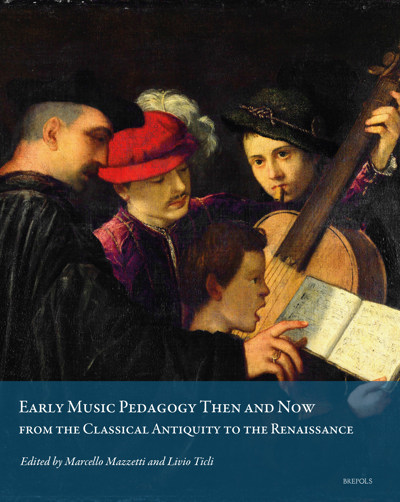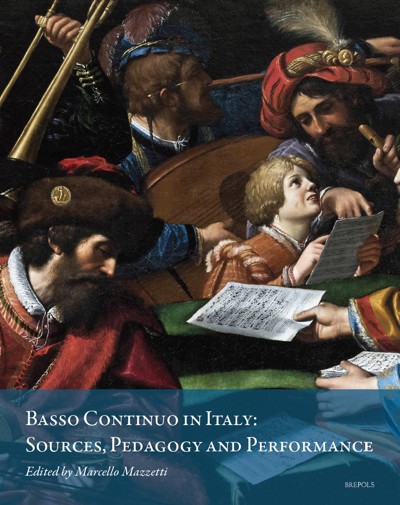
Early Music Pedagogy Then and Now
From the Classical Antiquity to the Renaissance
Marcello Mazzetti, Livio Ticli (eds)
- Pages: xxxii + 448 p.
- Size:210 x 270 mm
- Illustrations:41 b/w, 9 tables b/w., 113 music examples
- Language(s):English, Italian
- Publication Year:2025
- € 110,00 EXCL. VAT RETAIL PRICE
- ISBN: 978-2-503-61566-0
- Hardback
- Available
Contributions from thirteen scholars address topics ranging from the ancient Greek instrument helikōn used for musicians’ training to the evolution of the viola bastarda technique linking historical practices with modern applications.
"Early Music Pedagogy Then and Now si rivolge direttamente al mondo dell’insegnamento contemporaneo. Lo scopo non è infatti offrire una storia della pedagogia dell’Early music, quanto, piuttosto, investigare il tema da più prospettive al fine di evidenziare come le fonti pedagogiche del passato possano irrigare anche l’esperienza della pedagogia odierna." (Federico Terzi, in Ad Parnassum, 23/45, 2025, p. 115)
Marcello Mazzetti and Livio Ticli are scholars and performers specialising in Italian Renaissance and Early Baroque music. They co-chair the Istituto Italiano di Musica Antica, where they teach solmisation, Renaissance ornamentation and contrappunto alla mente, voice, and ensemble music. Mazzetti also lectures at the University of Padua, Turin, and the Bologna Academy of Fine Arts, in addition to teaching music history at the State Conservatoire in Brescia. Ticli is a lecturer in music history at the Venice Academy of Fine Arts and teaches at the State Conservatories of Genoa, Livorno, and Vicenza. Both are member of the editorial board of the Tasso in Music Project (UMass and Stanford University) and general editors of the series ‘Musica Incarnata: Pedsagogy, Performance and Market’ (Brepols).
This volume explores various aspects of early music teaching (Historically Informed Music Pedagogy), performance, and theory. Contributions from thirteen scholars address topics ranging from the ancient Greek instrument helikōn used for musicians’ training to the evolution of the viola bastarda technique linking historical practices with modern applications. Significant attention is given to methodological reflections on early music pedagogy, the reconstruction of incomplete pieces as a method for teaching counterpoint, and the role of improvisation and the creative process in vocal and instrumental music. Additional sections tackle the teaching of ornamentation, contrappunto alla mente and solmisation, with discussions on the status of Musica Practica and its philosophical and educational implications today. New perspectives are offered on Guido of Arezzo with an innovative contribution on the «Dialogus de musica».
Marcello Mazzetti – Livio Ticli, New Perspectives on Early Music: The Role of the Historically Informed Music Pedagogy
Section 1: Ancient and Medieval Foundations of Music Theory
Massimo Raffa, La geometria delle consonanze. Un antico strumento musicale greco fra teoria e pratica
Angelo Rusconi, Reopening a Cold Case: Guido (of Arezzo) Author of the Dialogus de musica in Pomposa?
Section 2: Renaissance Music Pedagogy and Self-Instructed Musicians
Adam Knight Gilbert, Singing and Sighting with Solmization in Performance and Pedagogy (c. 1450-1521)
Galliano Ciliberti, Essere autodidatta in musica a Perugia nel Rinascimento: il caso di Raffaello Sozi (1529-1589) con l’edizione dei suoi trattati di musica
Carmela Barbaro, Early Music in Contemporary Curricula: Polyphonic Reconstruction as Pedagogical Tool
Section 3: The Art of Improvisation in Early Music
Niels Berentsen, The Slow Death of Medieval Discant: Considering the «longue durée» in Historical Improvisation Pedagogy
James Hewitt, Limitation and Transformation as Creative Process in Solo Improvisation: A Study of the Sixteenth-Century Ricercar as Model
Catherine Bahn, Viola bastarda: Expanding the Role of the Viol through Improvisatory and Pedagogical Techniques
Section 4: Historical Music Pedagogy and Modern Applications
Isaac Alonso de Molina, Musica Practica: Genesis, Structure and Implications of the Pre-modern Discipline of Music
Marcello Mazzetti, Towards a ‘Historical Music Pedagogy’: Rediscovering the Role of the Cantor through an Integrated Approach
Livio Ticli, Learning Renaissance and Baroque Music Improvisation Improvisationally: Teaching and Inspiring a New Generation of Singers and Players
Sarah Mead, Old Maps for New Explorers: Insights of an Esperiential Approach to Teaching Early Music
Afterword
Stefano Lorenzetti, «Initium sapientiæ est timor Domini». Per una pedagogia delle virtù musicali tra passato, presente e futuro
Abstracts and Biographies
Index of Names


